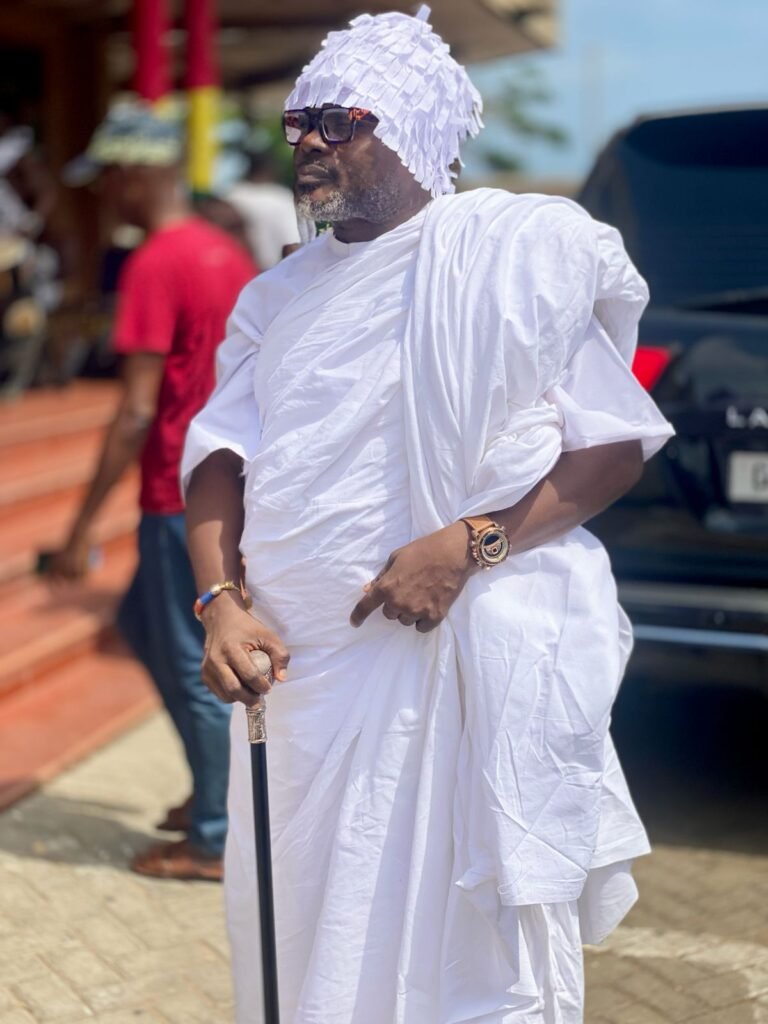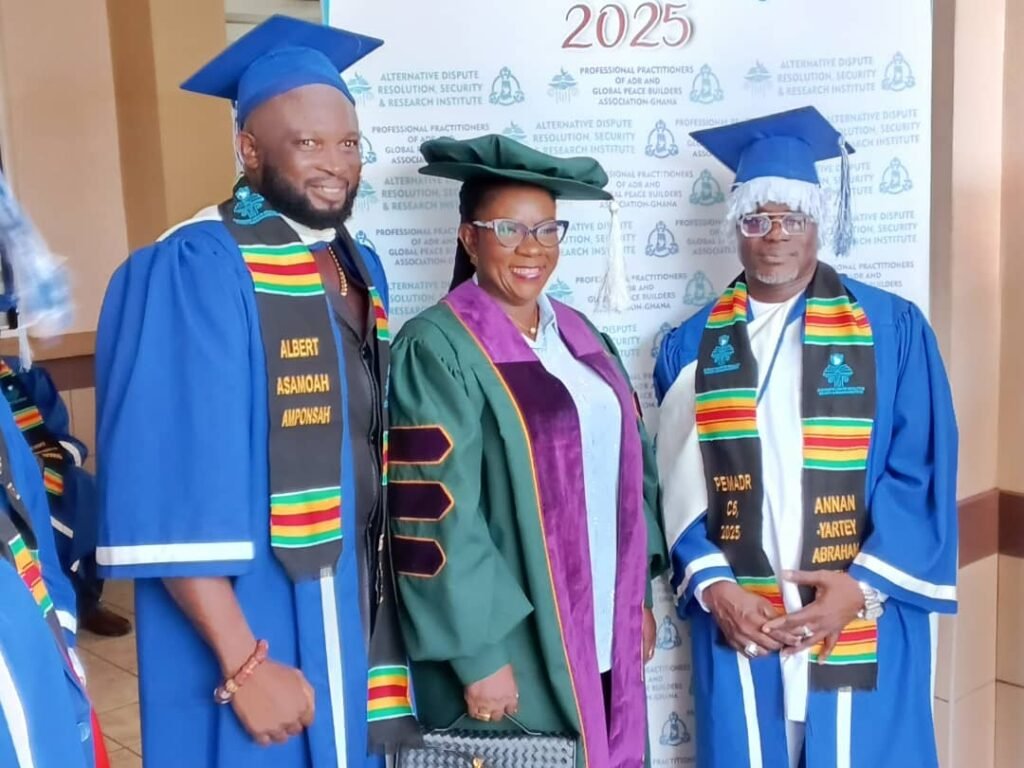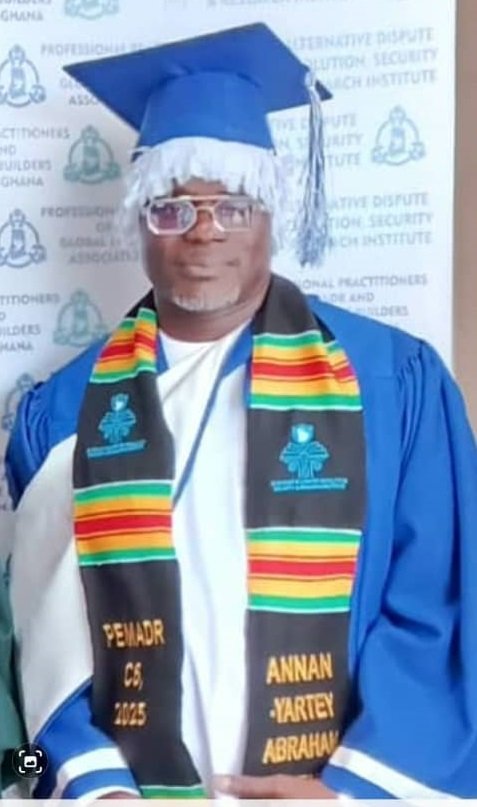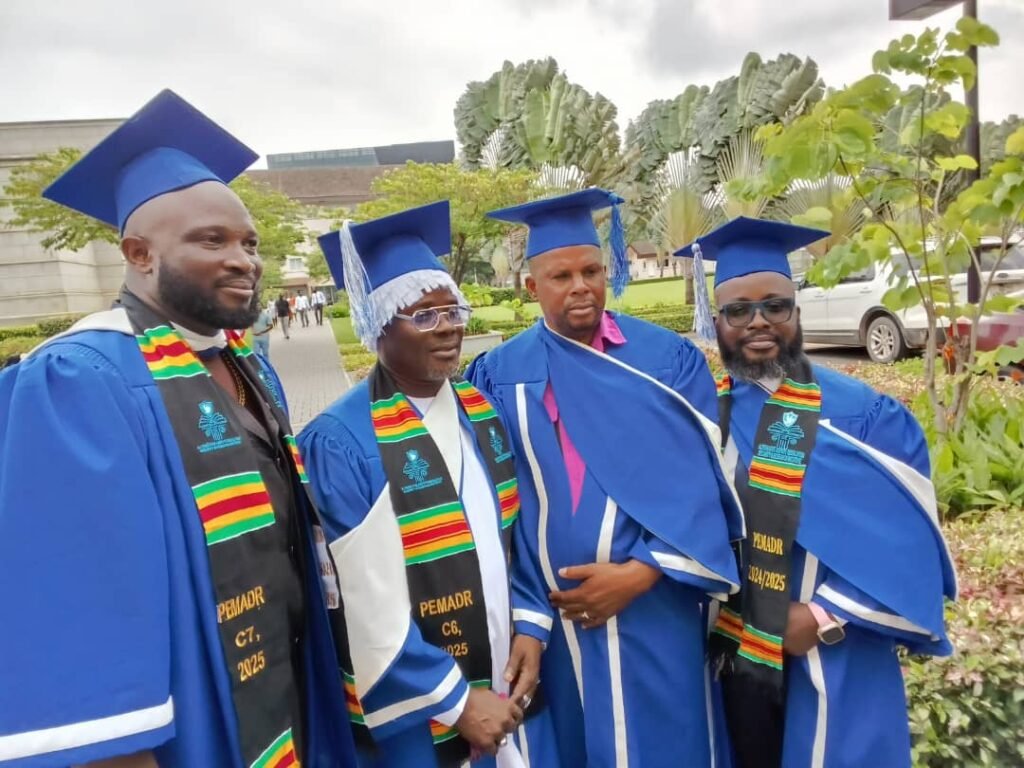News
Tradition meets academia: Nuumo Akwaa Mensah III, Nae Wulomo of the Ga State

In a quiet but profound revolution at the intersection of culture and modernity, Nuumo Akwaa Mensah III, the Nae Wulomo (Highest Chief Priest of the Ga State), is rewriting what it means to be a traditional leader in the 21st century.
Blending his spiritual calling with academic pursuit, the young priest stands today as both a custodian of ancient Ga customs and an advocate for intellectual growth and social progress.
His path to priesthood was not one of ambition but divine selection. In 2012, while studying sociology and psychology at De Montfort University in Denmark, he was called to occupy the vacant Nae Wulomo stool-an office that had remained empty since the death of his predecessor in 2006.
Chosen by the gods, not man, he became the youngest ever to take up this sacred mantle.
“I didn’t rush. I gave myself 10 years to understand the life I had been called into,” he said, explaining how he paused formal schooling to learn how to balance spiritual duty, education, family, and leadership. “I had to create my own strategy.”
That strategy led him not only to fulfill his duties as Nae Wulomo but to modernise aspects of Ga traditional systems.
He established a Traditional Arbitration Court in Accra, which handles spiritual and cultural disputes, and he envisioned transforming it into a structure recognised by the judicial system.
This ambition led him to pursue further training in Alternative Dispute Resolution (ADR), including mediation, court-connected arbitration, and legal processes.
“I needed to make our practices globally accepted without losing their sacred value,” he said.
Under the guidance of esteemed legal minds—Supreme Court Justices, retired judges, and legal scholars-he deepened his understanding of law and conflict resolution.
As a student, he remained humble, showing respect in academic circles, even standing for his lecturers during class. But when he returns to the spiritual domain, he is revered.
“When I’m in school, I stand for them. When I’m in my traditional role, they stand for me. It’s mutual respect,” he said, smiling.
As Nae Wulomo, Nuumo Akwaa Mensah III serves as the spiritual father of the Ga people. His responsibilities include leading sacred rituals, overseeing public prayers, settling land and chieftaincy disputes, and safeguarding the customs passed down through generations.
His authority, however, goes beyond rituals-it reaches into the core of Ga identity. Yet his biggest challenge, he admits, is public perception.
“People judge by appearance. When they see the white cloth, the staff, the bare feet, they assume primitiveness,” he says. “But our tradition is profound. The same things Christians use—water, oil, prayer, the rod—we also use. The difference is in the expression, not the spirit.”
He is vocal about the displacement of indigenous beliefs by imported religions. “Christianity came to meet our customs. But we have allowed it to dominate and diminish us,” he says. “Tradition is not anti-modernity. In fact, it is our original religion.”
He draws historical parallels, pointing out how Africans lived in harmony with nature, practised sacred taboos, and delivered babies with herbs and prayer—long before hospitals and churches arrived.
“Our ancestors lived over 100 years. Women gave birth at home and survived. Now, with modern systems, maternal deaths are higher,” he laments. “That should make us think.”
Despite societal bias, his shrine has become a space of learning. Scholars from across the country and beyond-including students of African Studies and Religious Studies-regularly visit him for insight.
“I have had students come from University of Development Studied (UDS), University of Ghana Legon, University of Education Winneba,” he notes. “They leave with a new understanding. Some say they felt something shift in them.”
He hopes one day to lecture formally, especially in African Traditional Religion. “It would be a privilege,” he said. “A platform to demystify, to teach the true essence of who we are.”
Nuumo Akwaa Mensah III’s achievements speak for themselves: the modernisation of his arbitration court, the spiritual guidance provided to hundreds, the opening of his shrine to researchers, and his advocacy for restoring pride in African spirituality.
Perhaps most importantly, he has challenged the idea that to be modern, one must abandon tradition. Instead, he has shown that the two can coexist—and even strengthen each other.
“Our tradition is not behind. It is misunderstood,” he insists. “We must stop fearing who we are. Our customs carry wisdom, order, and power.”
Beyond his roles in tradition and law, Nuumo Akwaa Mensah III has a deep love for music, particularly traditional and, spiritual chants, and classical African rhythms.
Music, to him, is both a sacred tool and a personal passion. He believes traditional soundscapes carry healing properties and ancestral memory.
And to the youth navigating between old paths and new dreams, his advice is simple yet profound- “never abandon your roots.
He encouraged them to be proud of where they come from, urging them to pursue education and excellence, and not let society convince them that their identity is something to be ashamed of. “Tradition is not your obstacle- it is your strength,” he added.
By Esinam Jemima Kuatsinu
News
Gender Ministry holds fourth quarter advisory board meeting

The Ministry of Gender, Children and Social Protection (MoGCSP) has held its Fourth Quarter Ministerial Advisory Board Meeting to review progress, discuss key policy matters, and strengthen collaboration towards achieving its strategic goals.
The meeting brought together members of the Advisory Board, which was set up under Section 39 of the Civil Service Act, 1993 (PNDCL 327), and the Civil Service (Ministerial Advisory Board) Regulations, 2010 (L.I. 1961).
The Board serves as a platform for continuous engagement between the Ministry and its stakeholders.
Its role is to advise the sector Minister on policy planning and implementation, while ensuring that programmes on gender, social protection, and child welfare align with national priorities and government development goals.
The Minister for Gender, Children and Social Protection, Dr. Agnes Naa Momo Lartey, commended the Board for its consistent support and technical guidance in advancing the Ministry’s mandate.
She noted that the Ministry’s work in promoting gender equality, protecting the vulnerable, and ensuring the welfare of children and families depends on strong policies and effective partnerships.
Dr. Lartey stressed that the Advisory Board plays an important role in helping the Ministry deliver its mission in a sustainable and impactful way.
A major highlight of the meeting was a presentation on the Ministry’s achievements so far this year, followed by discussions on future policy direction and strategic focus areas.
By: Jacob Aggrey
News
Speaker Bagbin elected chairperson of inter-parliamentary union Africa group

The Speaker of Parliament, Alban Sumana Kingsford Bagbin, has been unanimously elected as the Chairperson of the Africa Geopolitical Group of the Inter-Parliamentary Union (IPU).
The election took place on October 19, 2025, during the ongoing 151st IPU Assembly in Geneva, Switzerland. His victory places Ghana at the center of continental and global parliamentary diplomacy.
With this new role, Speaker Bagbin will coordinate and harmonize Africa’s collective positions on major IPU decisions and policies.
He will also serve as the continent’s chief representative on key issues such as governance, peace, security, and sustainable development.
Speaker Bagbin currently serves as the President of the Conference of Speakers and Presidents of African Legislatures (COSPAL) and is the immediate past Chairman of the Commonwealth Parliamentary Association (CPA) International.
In his remarks after the election, he thanked African delegations for their confidence and unity, particularly commending Nigeria for seconding his nomination and Senegal for withdrawing its candidate in the spirit of cooperation.
He pledged to strengthen collaboration among African parliaments and promote transparency, democratic governance, and sustainable development through stronger legislative institutions.
He succeeds Ms. Angela Thokozile Didiza, Speaker of South Africa’s National Assembly, who served with distinction.
The Africa Geopolitical Group, formed in the early 1950s, serves as a continental branch of the IPU, ensuring fair representation of African countries in the Union’s committees and decision-making bodies.
It also coordinates Africa’s common positions on major parliamentary issues discussed at IPU assemblies.
By: Jacob Aggrey















